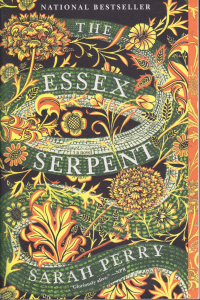 The Essex Serpent isn’t what it appears to be.Sarah Perry’s debut American novel (although it’s her second elsewhere, publishing being the strange beast that it is) was much anticipated.Like the serpent itself, the novel is difficult to describe.It comes down to a minister, a widow, and they people with whom they associate.Instead of going through the complex storyline, I would instead note that once again a novel that explores religion has garnered quite a lot of attention.It’s difficult to believe the official narrative that we’re constantly fed that religion is well beyond its expiration date when it continues to appear in print media as a prime motivator for people in all kinds of situations.Novels, however, aren’t popular in the way television, movies, and video games are, so this is worth pondering.
The Essex Serpent isn’t what it appears to be.Sarah Perry’s debut American novel (although it’s her second elsewhere, publishing being the strange beast that it is) was much anticipated.Like the serpent itself, the novel is difficult to describe.It comes down to a minister, a widow, and they people with whom they associate.Instead of going through the complex storyline, I would instead note that once again a novel that explores religion has garnered quite a lot of attention.It’s difficult to believe the official narrative that we’re constantly fed that religion is well beyond its expiration date when it continues to appear in print media as a prime motivator for people in all kinds of situations.Novels, however, aren’t popular in the way television, movies, and video games are, so this is worth pondering.
While novels are sometimes disparaged in higher education, their clientele tends to be an educated one.It takes more commitment to sit down and read a 400-page tome than it does to flip on some device and meander from app to app, channel to channel, or website to website.Novel reading takes some concentrated effort.Remembering characters and connections across a span of days or weeks as you wend your way through.And one thing novelists do, at least in my experience, is explore the way religion makes us who we are.I don’t choose novels for that reason; I thought The Essex Serpent would be a monster story (remember, I don’t read reviews before reading the book).
My guess is that if you read this blog you’re a potential reader of novels like this, so I won’t offer any spoilers.The book is suffused with biblical language, as befits a story with a clergyman as a major character.The protagonist, however, is an irreligious widow on a journey of self-discovery.Having been dominated by a wealthy husband, she now explores paleontology in a Victorian context.Although the year is never stated, the novel manages to find that Gothic near-ghost-story feel with the close interplay of death by consumption and fear of the dark.It’s not a scary book by any means, although there’s plenty of mist in Essex, and a little gruesome detail of what people can do to each other.The novel caught my attention via reviews I never read and has left me pondering what I’ve just experienced.And it has reinforced my conviction that, despite what the critics may say, religion is what motivates us, whether we admit it or not.And serpents may not be what they seem.
